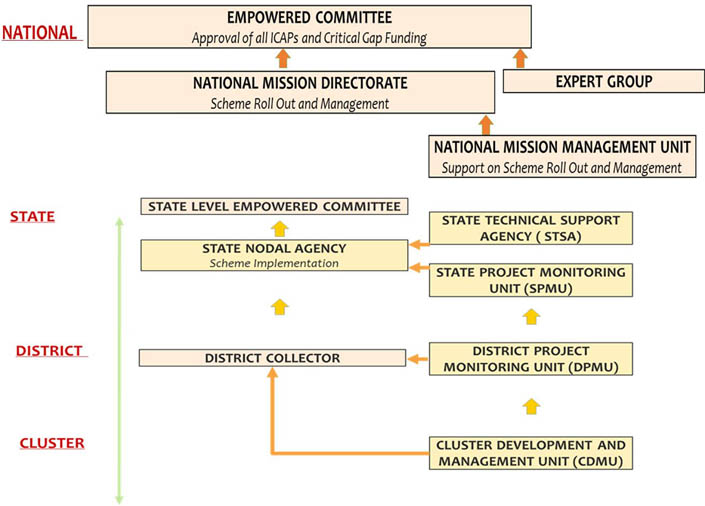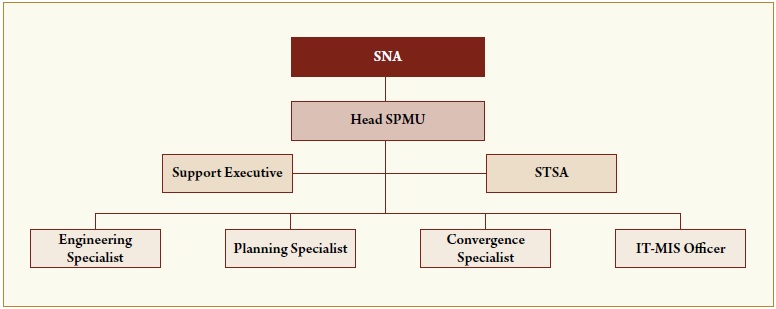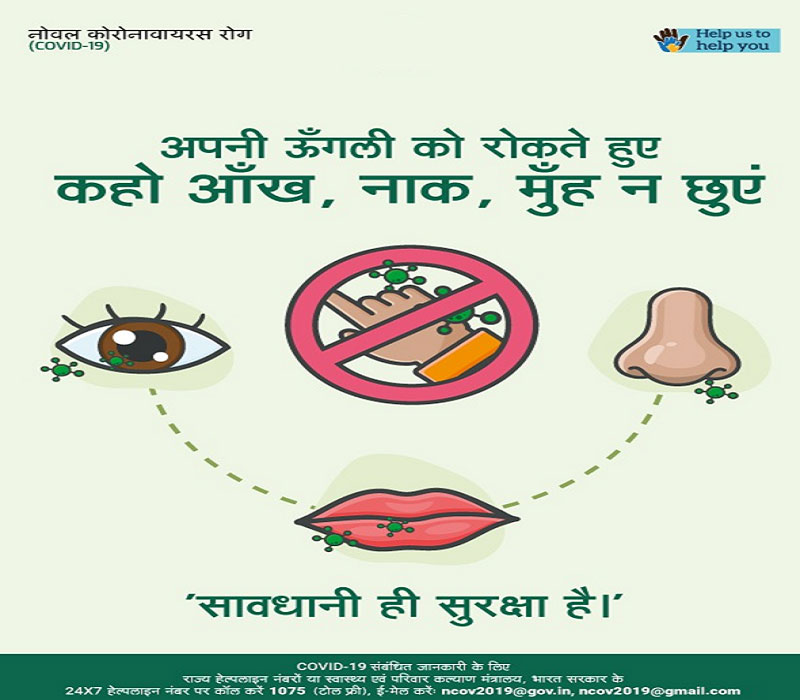Institutional Framework
The Shyama Prasad Mukherji Rurban Mission (SPMRM) has proposed institutional frameworks vide section 8.0 of the Framework of Implementation–Part 1. The Mission will be implemented keeping the States as anchors and key implementers. The institutional framework under the Mission envisages the engagement of key stakeholders at the National, State, District and Gram Panchayat level for implementing the Mission.
While, Institutional frameworks have been set up at the National level for formulation and facilitating the implementation of the Mission by the Ministry, The State Institutional Frameworks will play a key role in implementing the Mission. The State Institutional arrangements will be expected to identify Rurban clusters, plan its development through preparation of Integrated Cluster Action Plans (ICAPs) and thereafter implement and support in the operations and maintenance of the Rurban cluster.

Empowered Committed (EC): Headed by Secretary, Ministry of Rural Development, will be constituted at Ministry, which will approve the ICAPs submitted by the States and approve the CGF for the cluster and take other necessary decisions and steps to ensure coordination with other Central Ministries and State Governments, to facilitate successful implementation of the Scheme.
Expert Group: An Expert Group will be constituted at Ministry which will comprise representatives of relevant institutions and departments and eminent persons in the related sectors of the Mission. The mandate of the Expert Group will be to evaluate the ICAPs before it is sent to the Empowered Committee for final approval. Ministry may also seek guidance from the Expert Group on matters related to NRuM from time to time during the Mission period.
National Mission Management Unit (NMMU): The SPMRM will be run at the Centre, by the National Mission Directorate headed by the Joint Secretary, in-charge at the Ministry of Rural Development. This Mission Directorate would be supported by a National Mission Management Unit (NMMU).

State Level Empowered Committed (SLEC): at the State level will be headed by the Chief Secretary and will recommend the ICAPs and approve the DPRs and CGF applications before submission to the Ministry. The SLEC will also be responsible for key decisions at State level for effective coordination and implementation of the scheme.
State Nodal Agency (SNA): At the State level, Department of Rural Development or an Agency or any Department nominated by the State Government will be designated as the State Nodal Agency (SNA) for purposes of the Rurban Mission. The Department/SNA will be supported by a State Project Management Unit (SPMU) to be set up in the Department/ SNA. Preferably, the selected agency should be under the administrative domain of the State Government's Rural Development and/or Panchayati Raj Department, as the case may be.
State Project Management Unit (SPMU): This will be a technical and operational unit attached to the Department/SNA, mandated to provide overall support to the SNA to successfully run the mission. The SPMU would be headed by a senior rural development expert and would comprise specialists in Convergence, Planning, Engineering, IT & MIS.
State Technical Support Agencies (STSAs): State Technical Support Agencies (STSAs) would be Institutions of repute, empaneled by the Ministry and engaged by the States, to support in selection of clusters, preparation of ICAPs and to hand hold the States in these processes

District Level Committee: The Committee would be constituted with the officers of the concerned line Departments and Sarpanches of the concerned Gram Panchayats. District Level Committees are required for empowering decisions at the District level especially on matters concerning convergence and district level coordination.
District Project Management Unit (DPMU): may be set up at the District Collector's office with upto three professionals, i. Regional Planning Specialist; ii. Convergence Specialist and; iii. Rural Development and Management Specialist. There will be only one DPMU in a District. The existing pool of Prime Minister Rural Development Fellows (PMRDFs) of the State wherever present may also be engaged. The District Project Management Unit will report to the District Collector. This unit shall be responsible for coordinating with implementing departments/ agencies for ensuring notification of planning areas and related spatial planning matters, convergence of schemes planned in the ICAP in an integrated and time-bound manner. These DPMUs shall also work in close co-ordination with the SPMU.
Cluster Development and Management Unit (CDMU): This unit will be set-up for each cluster. This unit will consist of at least two professionals, i. Spatial planning professional and; ii. Rural management/ development professional. This unit will closely monitor the spatial planning aspects and the ICAP preparation for the cluster and will also closely monitor the progress of the activities in the cluster and provide regular updates to the DPMU/SPMU. The CDMU Team comprising one Spatial Planning Professional and one Rural Development Professional for each cluster will be recruited and will report to the DC.
Role of Panchayati Raj Institutions: The State Nodal Agency will consult the Panchayati Raj Institutions at the Zilla, Panchayat Samiti and the Gram Panchayat on the SPMRM activities to be undertaken in the Clusters. The Mission should be adopted by the Gram Sabhas of all the participating Gram Panchayats through Gram Sabha. PRI members are to be included at all stages of the project cycle from planning, implementation, monitoring and evaluation and maintenance of assets created during the project period.
